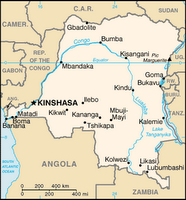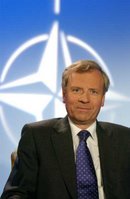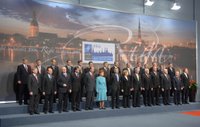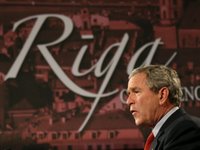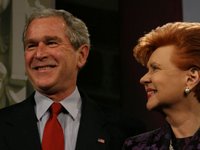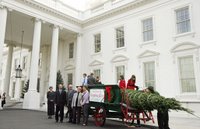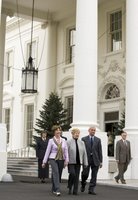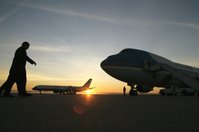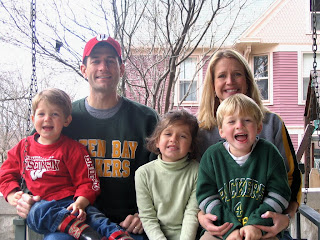President Bush Participates in Joint Press Availability with Prime Minister Maliki of Iraq, FULL STREAMING VIDEO, Joint Statement by the President of the United States and the Prime Minister of Iraq, and Renewal in Iraq or In Focus: Global Diplomacy, Four Seasons Hotel Amman, Amman, Jordan, 9:43 A.M. (Local)
PRESIDENT BUSH: Good morning. It's good to be in Amman. I first want to thank His Majesty King Abdullah for his gracious hospitality.
 | Prime Minister Maliki and I just had a very productive meeting. This is the third time we've met since he took office six months ago, and with each meeting I'm coming to know him better. |
He's a strong leader who wants a free and democratic Iraq to succeed. The United States is determined to help him achieve that goal.
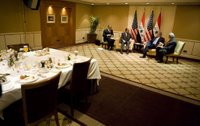 | I told the Prime Minister we're ready to make changes to better support the unity government of Iraq, and that certain key principles behind our strategy remain firm and they're fixed. |
First, we believe the success of Prime Minister Maliki's government is critical to the success in Iraq. His government was chosen by the Iraqi people through free elections in which nearly 12 million people defied terrorists to cast their ballots. I've told the Prime Minister that our goal in Iraq is to strengthen his government and to support his efforts to build a free Iraq that can govern itself, sustain itself, and defend itself, and is an ally in the war against the terrorists.
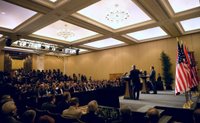 | Secondly, the success of the Iraqi government depends on the success of the Iraqi security forces. During our meetings, the Prime Minister and I heard an update from an important group,/td> |
that our government established last month: the Joint Committee on Accelerating the Transferring of Security Responsibility. We agreed on the importance of speeding up the training of Iraqi security forces. Our goal is to ensure that the Prime Minister has more capable forces under his control so his government can fight the terrorists and the death squads, and provide security and stability in his country.
 | Third, success in Iraq requires a united Iraq where democracy is preserved, the rule of law prevails, and minority rights are respected. |
The Prime Minister made clear that splitting his country into parts, as some have suggested, is not what the Iraqi people want, and that any partition of Iraq would only lead to an increase in sectarian violence. I agree. In the long-term, security in Iraq requires reconciliation among Iraq's different ethnic and religious communities, something the overwhelming majority of Iraqis want.
 | The Prime Minister and I also discussed the review of our strategy in Iraq that is now nearing completion. I assured the Prime Minister that our review is aimed at strengthening the capacity of the sovereign government |
of Iraq to meet their objectives, which we share. As part of the review, I've asked our military leaders in the Pentagon and those on the ground in Iraq to provide their recommendations on the best way forward.
Others outside the government are conducting their own review, and I look forward to hearing their recommendations. I want to hear all advice before I make my decisions about adjustments to our strategy and tactics in Iraq to help this government succeed.
My consultations with the Prime Minister and the unity government are a key part of the assessment process. And that's why I appreciate him coming over from Iraq so that we could have a face-to-face visit. The Prime Minister and I agree that the outcome in Iraq will affect the entire region. To stop the extremists from dominating the Middle East, we must stop the extremists from achieving their goal of dominating Iraq. If the extremists succeed in Iraq, they will be emboldened in their efforts to undermine other young democracies in the region, or to overthrow moderate governments, establish new safe havens, and impose their hateful ideology on millions. If the Iraqis succeed in establishing a free nation in the heart of the Middle East, the forces of freedom and moderation across the region will be emboldened, and the cause of peace will have new energy and new allies.
Mr. Prime Minister, I want to thank you again for your time. I appreciate your friendship, and I appreciate the courage you show during these difficult times as you lead your country.
PRIME MINISTER MALIKI: (As translated.) Thank you. In the name of God. In the beginning, I would like to thank King Abdullah for hosting this meeting. And I would also like to thank the President of the United States for his response and for the role that he has shown in dealing most positively with all the files that we've discussed.
And I would like, during this occasion as we leave this transitional stage, we have won initially when we have accomplished democracy in Iraq and when we give Iraq the permanent constitution and the parliament and the unity government. And all these are victories that are victories with the principles that we believe in. And therefore, these victories were our decision not to let those who would like to tamper with the fates of the region, or those who oppose democracy to win, so that the despotic regime comes back. And Iraq will never be a safe haven for terrorists who are trying to spread darkness instead of light, the light that started in Mesopotamia.
We have many visions and many ideas about the transformation process and we are determined to succeed in the face of all the challenges that we believe are probably -- should exist in a situation such as the situation that Iraq is going through. These are not outrageous challenges. There are criminals, there are people who are breaking the law. But the steel strength of the national unity government would help us face all those who are breaking the law, or those who are trying to take down democracy in Iraq, or those who are conspiring and trying to have coups or basically bring down the national unity government.
We are active with anybody who are working within the framework of the constitution. Because we established the constitution, we'll abide by it, we'll protect it, and we'll be protected by it. We assure everybody that we are in alliance with the international community in facing all the challenges that the world is facing. And foremost of those challenges is terrorism. Terrorism is not a danger only to Iraq, it's a culture, it's an ideology. The whole civilized world must face it as one line, one unit. Some people might not understand the successes that we have as we daily face terrorism in Iraq and as the security forces in Iraq chase them down, arrest them. This is solid strength based on our vision, and our vision is that terrorism, terroristic ideology, extremism, sectarianism are all issues that will rob humans from happiness.
We are ready to cooperate with everybody who believe that they need to communicate with the national unity government, especially our neighbors. Our doors are open, and our desire is strong that between us and our neighbors, we will have strong relationships based on mutual respect and staying away from everybody's internal business. Iraq is for Iraqis, and its borders will be sound and will not allow anybody to violate these borders or interfere in our internal affairs.
So everybody who is trying to make Iraq their own influences appear on the account of the Iraqi people needs to recalculate for it will not happen. And all the political forces in Iraq have agreed on that. They want to form a very strong political base to support the national unity government. We have visions in Iraq, and we are at the steps of transformation into a new stage where we'll have security plans that we believe will be effective and will deliver what is required.
In Iraq, we don't only deal with terrorism. We're dealing with building a whole state in all its aspects -- political, economic, security, militarily -- and all these are signs of maturity that are now very obvious in Iraq. And we hope that they will be complemented and supported by the international community and by our neighbors, who I hope that will be supportive not only for the benefit of Iraq, for the benefit of those countries, as well.
PRESIDENT BUSH: We will take a couple of questions. Abramowitz.
Q Mr. President, the memo from your National Security Advisor has raised the possibility the United States should press Prime Minister Maliki to break with Moqtada al-Sadr. Is this, in fact, your strategy? And did you raise this issue with the Prime Minister this morning?
And to the Prime Minister, I'd like to ask, the President's Advisor has said that a central problem in Iraq is your close alliance with Mr. al-Sadr, and did you make any representations to the President that you would break with al-Sadr, and could your government survive such a break?
PRESIDENT BUSH: I will let the Prime Minister talk about his relations with al-Sadr. I will tell you that he and I spent a lot of time talking about the security situation inside of Iraq. I expressed my concern about the security situation; he expressed his concern about the security situation. After all, one of his most important jobs is to provide security for the Iraqi people. Part of the Prime Minister's frustration is, is that he doesn't have the tools necessary to take care of those who break the law.
I was reassured by his commitment to a pluralistic society that is politically united, and a society in which people are held to account if they break the law -- whether those people be criminals, al Qaeda, militia, whoever.
He discussed with me his political situation, and I think it is best that he talk to you about the Sadr group or any other group he wants to talk about inside of Iraq.
PRIME MINISTER MALIKI: Matter of fact, my coalition is not with only one entity. The national unity government is a government formed of all the entities that participated in it. Therefore, that coalition basically represents a national responsibility.
And Mr. Sadr and the Sadrists are just one component that participate in the parliament or in the government. And I think participating in the government is a responsibility and it's a mutual commitment, and those who participate in this government need to bear responsibilities. And foremost upon those responsibilities is the protection of this government, the protection of the constitution, the protection of the law, not breaking the law.
Therefore, I do not talk about one side at the expense of the other. I'm talking about a state; I'm talking about law; I'm talking about commitments. And this should apply to all the partners in the government who have chosen to participate in the political process.
As to the issues that would pertain to violating the law or breaking the law, we would deal with them the same way, because the most important principle is the sovereignty and the power and the establishment of the state that must be borne by the state, but only our partners should participate in that.
Q Hezbollah has denied that his forces trained Moqtada al-Sadr forces, but do you have any information if Hezbollah has actually trained the forces of Moqtada al-Sadr?
PRIME MINISTER MALIKI: I think they expressed itself and expressed its responsibilities. And one -- another time I would like to say that Iraq and all the Iraqis in the political process; nobody has the right, outside of Iraq, to interfere in the political or the security situation inside of Iraq. We invite everybody to cooperate with us, but as far as this issue related to training, Hezbollah denied and they're responsible for their denial.
PRESIDENT BUSH: Our objective is to help the Maliki government succeed. And today we discussed how to further the success of this government. This is a government that is dedicated to pluralism and rule of law. It's a government elected by the Iraqi people under a constitution approved by the Iraqi people, which, in itself, is an unusual event in the Middle East, by the way.
We talked today about accelerating authority to the Prime Minister so he can do what the Iraqi people expect him to do, and that is bring security to parts of his country that require firm action. It's going to -- the presence of the United States will be in Iraq so long as the government asks us to be in Iraq. This is a sovereign government. I believe that there is more training to be done. I think the Prime Minister agrees with me. I know that we're providing a useful addition to Iraq by chasing down al Qaeda and by securing -- by helping this country protect itself from al Qaeda.
Al Qaeda wants a safe haven in Iraq. Al Qaeda made it clear earlier that suicide bombers would increase sectarian violence. That was part of their strategy. One of our goals is to deny safe haven for al Qaeda in Iraq, and the Maliki government expects us and wants us to provide that vital part of security.
So we'll be in Iraq until the job is complete, at the request of a sovereign government elected by the people. I know there's a lot of speculation that these reports in Washington mean there's going to be some kind of graceful exit out of Iraq. We're going to stay in Iraq to get the job done, so long as the government wants us there.
We want the people of Iraq to live in a free society. It's in our interests. In my judgment, if we were to leave before the job is done, it would only embolden terrorists, it would only embolden the extremists. It would dash the hopes of millions of people who want to live in a free society, just like the 12 million people who voted in the Iraqi election. They want to live in a free society. And we support this government, because the government understands it was elected by the people. And Prime Minister Maliki is working hard to overcome the many obstacles in the way to a peaceful Iraq, and we want to help him.
Let's see -- Martha.
Q Mr. President, is there a time limit on meeting any of these goals for Prime Minister Maliki? And you keep mentioning that the U.S. goal is to fight al Qaeda. Does that mean you believe it's up to the Iraqis to stop the sectarian violence and quell the sectarian violence, and this is something you don't want U.S. troops involved in?
And Prime Minister Maliki, can you tell us why you canceled the meeting last night?
PRESIDENT BUSH: What was the first part of your three-part question? (Laughter.)
Q Time limit on meeting goals. Is there a time limit on meeting goals?
PRESIDENT BUSH: A time limit. As soon as possible. But I'm realistic, because I understand how tough it is inside of Iraq. The Prime Minister is dealing with sectarian violence. The Prime Minister is having to deal with al Qaeda. The Prime Minister is having to deal with criminal elements. And we want to help him.
And, yes, I talked about making sure that al Qaeda doesn't take -- doesn't provide -- gets safe haven in Iraq. Sure, that's an important part of our strategy. But I also have said that the goal is a country that can defend, sustain, and govern itself. And therefore, to the extent that our troops are needed to help do that, we're willing to do that. That's part of the operation in Baghdad. Part of the plan in Baghdad was to prevent -- prevent killers from taking innocent life.
Q Including sectarian violence?
PRESIDENT BUSH: Well that's -- killers taking innocent life is, in some cases, sectarian. I happen to view it as criminal, as well as sectarian. I think any time you murder somebody, you're a criminal. And I believe a just society and a society of -- that holds people to account and believes in rule of law protects innocent people from murderers, no matter what their political party is.
And I discussed this with the Prime Minister, and I don't want to put words in his mouth, but I received a satisfactory answer about the need to protect innocent life. And that's exactly what our troops have been doing, along with the Iraqis. My plan, and his plan, is to accelerate the Iraqis' responsibility. See, here's a man who has been elected by the people; the people expect him to respond, and he doesn't have the capacity to respond. And so we want to accelerate that capacity. We want him to be in the lead in taking the fight against the enemies of his own country.
And that's exactly what we discussed today. We had a Joint Committee on Accelerating the Transfer of Security Responsibility Report. And it was a report that General Casey, who is with us today, and our Ambassador Zal Khalilzad, who is with us today, as well as the Prime Minister's team, delivered to both of us about how to accelerate responsibility to the Iraqi government so this person elected by the people can take the fight to those who want to destroy a young democracy.
You had a question --
Q Sir, there are no time limits here?
PRESIDENT BUSH: As quick as possible, Martha. As quick -- I've been asked about timetables ever since we got into this. All timetables mean is that it -- it is a timetable for withdrawal. You keep asking me those questions. All that does is --
Q Mr. President --
PRESIDENT BUSH: Hold on a second. All that does is set people up for unrealistic expectations. As soon as possible. And today, we made a step toward as soon as possible by transferring a -- accelerating the transfer of authorities, military authorities to the Prime Minister.
Q Did you put any pressure --
PRESIDENT BUSH: Hold on a second. Hold on, please, sir. Please. Thank you.
PRIME MINISTER MALIKI: I emphasize what the President has just said, that we have agreed together, and we are very clear together, about the importance of accelerating the transfer of the security responsibility. And be assured that the Iraqi forces and the security forces have reached a good level of competency and efficiency to protect Iraq as a country and to protect its people.
As far as the other issue related to the meeting, I have met with King Abdullah, then have met again with his Prime Minister, and a group of his ministers, and we've discussed bilateral relations that are of concern to both nations -- Iraq and Jordan -- and that relationship is based on mutual friendship and being a good host and a good neighbor. And there was not part of our agenda a trilateral meeting, so there is no problem.
Please.
Q (As translated.) Did you discuss with the President the Iranian influence that is expanding in Iraq, and the almost complete Iranian control over Baghdad, as the press sources seems to indicate? -- did you build this big wall between Iraq and Iranian? So and are you going to deal with --
PRESIDENT BUSH: Did I -- I didn't understand your first question.
Q To deal with Iranian directly?
PRESIDENT BUSH: Am I going to meet with the Iranians directly, is that the question?
Q The question of Iraq, yes.
PRIME MINISTER MALIKI: As far as the first question that was mentioned by the reporter, I think these are wrong and exaggerated information, and they are being used as one of the propaganda mechanisms to give the impression of sectarian strife so that will reach a point of no return. Because we want to emphasize that we will not allow anybody to exert their control over any part of Iraq. If there is any talk about intervention in Iraq and all the discussion, all the talks about people or other nations exerting control over Iraq, this is not true. This is a political process in Iraq. We want good relationships with our neighbors, we want complementary relationships with our neighbors to protect the region from tensions. But the main principle underlying all this is the respect of the Iraqi borders and the internal affairs of Iraq.
PRESIDENT BUSH: I believe the Iranians fear democracy, and that's why they destabilize Lebanon; that's why they are worried about the establishment of a Palestinian state.
I appreciate the Prime Minister's views that the Iraqis are plenty capable of running their own business and they don't need foreign interference from neighbors that will be destabilizing the country. I am very worried, as should the world, about Iran's desires to have a nuclear weapon and, therefore, will continue to work with the world to send a clear message to the Iranians, the Iranian government, that we will -- they will become more isolated. And my message to the Iranian people is we have no beef with the Iranian people. We respect their heritage, we respect their history, we respect their traditions. I just have a problem with a government that is isolating its people, denying its people benefits that could be had from engagement with the world.
I told the Prime Minister, we'll continue to work with the world community to insist that Iran abandon its nuclear weapons programs. And I have said that if they were to verifiably suspect their enrichment program, we would part of the EU3 plus Russia plus China discussions. They know how to get us to the table. The choice is theirs to make. It's the choice of the Iranian government as to whether or not they make the right decisions, for not only the sake of the diplomacy, but for the sake -- more importantly, for the sake of their people.
We might as well keep going, Prime Minister.
Richard. Please, sir. Please. Thank you.
Q When you were in Baghdad six months ago, you expressed the same kind of confidence in the Prime Minister and his government that you've expressed today. Yet there have been repeated rounds of disappointments when it comes to the Prime Minister's Baghdad Security Plan, with his plans for reconciliation. I'm wondering, if anything, if you've had any doubts over the last six months about the strength of his government, about the Prime Minister's own abilities. And what gives you such confidence today to think that he can achieve what he hasn't done over the last six months?
PRESIDENT BUSH: Well, as you mentioned, he's been in power for six months, and I've been able to watch a leader emerge. The first thing that gives me confidence is that he wants responsibility. A sign of leadership is for somebody to say, I want to be able to have the tools necessary to protect my people. One of his frustrations with me is that he believes we've been slow about giving him the tools necessary to protect the Iraqi people. And today we had a meeting that will accelerate the capacity for the Prime Minister to do the hard work necessary to help stop this violence. No question it's a violent society right now. He knows that better than anybody. He was explaining to me that occasionally the house in which he lives gets shelled by terrorists who are trying to frighten him.
And so the second point I make to you is that I appreciate his courage. You can't lead unless you have courage. And he's got courage, and he's shown courage over the last six months. Thirdly, he has expressed a deep desire to unify his country. You hear all kinds of rumors about the politics inside of Iraq. I'm talking to the man face-to-face, and he says that he understands that a unified government, a pluralistic society, is important for success. And he's making hard decisions to achieve that.
No question it's been tough. It would have been a lot easier had people not tried to destabilize the young democracy. His job would have been more simple had there not been terrorists trying to create sectarian violence.
Now, I want everybody to remember that it was Mr. Zarqawi of al Qaeda who said, let us bomb Shia in order to create the
conditions necessary for sectarian violence. The Samara bombing started off this new phase of violence. The Prime Minister comes in about halfway through that phase in order to -- he'd been selected and now he's dealing with a serious situation on the ground. And what I appreciate is his attitude. As opposed to saying, America, you go solve the problem, we have a Prime Minister who's saying, stop holding me back, I want to solve the problem.
And the meeting today was to accelerate his capacity to do so. It's not easy for a military to evolve from ground zero, and I appreciate our forces, and I appreciate General Casey, who have worked very hard to train the Iraqis so they become a capable fighting force, as well as a unifying element for Iraq. But it's one thing to put people in uniform, and another thing to have clear command structure, or the capacity to move troops from point A to point B, or the capacity to make sure that the troop carrier from point A to point B has got the necessary air in its tires or oil in its engine. In other words, this is a sophisticated operation to get a unifying army stood up.
And one of the reasons I appreciate the Prime Minister is that he, on the one hand, sees that it's a sophisticated operation to get a military up from zero, but on the other hand, is frustrated by the pace. And the reason why he's frustrated is because he wants to show the people who elected him that he is willing to take the hard tasks on necessary to provide security for the Iraqi people, such as hunting down those who are killing the innocent. And the reason I came today to be able to sit down with him is to hear the joint plans developed between the Iraqi government, the sovereign government of Iraq, and our government, to make sure that we accelerate the transfer of capacity to the Prime Minister. And I know he's looking forward to more capacity being transferred so he can do his job.
Anyway, he's the right guy for Iraq, and we're going to help him, and it's in our interest to help him, for the sake of peace.
Q Mr. President -- what is your -- Prime Minister Olmert and President Abu Mazen to keep this cease-fire agreement? And what should be done --
PRESIDENT BUSH: Well, first of all, there's no question that if we were able to settle the Palestinian-Israeli issue, it would help bring more peace to the Middle East. And therefore, our government is focused on helping develop the two-state solution. As a matter of fact, I was the -- our government strongly believes in the two-state solution, and I believe it's in the Palestinian people's interest that they have their own state. And I believe it's in Israel's interest that there be a democracy on her border. And therefore, we're working to that end.
Look, there are extremists who want to stop the development of a Palestinian state, just like there are extremists who want to destabilize Lebanon -- and we're strongly in support of the Siniora government -- just like there are extremists who want to destabilize this young democracy. Isn't it interesting that the radicals and extremists fear democracy so much that they're willing to kill innocent people? And the task at hand is to support moderate, reasonable people in their quest for free societies. And that means that Abu Mazen, who I believe wants there to be a Palestinian state living side-by-side with peace in Israel, deserves the support of the world. And he deserves support in peeling his government away from those who do not recognize Israel's right to exist.
And therefore, Condoleezza Rice will be going to talk to Abu Mazen tomorrow, as well as Prime Minister Olmert, working with both parties together to see how we can advance the vision that the Prime Minister himself talked about earlier this week.
Q And your advice to both of them?
PRESIDENT BUSH: My advice is, support reasonable people and reject extremists. Understand that most people want to live in peace and harmony and security. It's very important for the American people to understand that most Muslim mothers want their children to grow up in peace, and they're interested in peace. And it's in our interest to help liberty prevail in the Middle East, starting with Iraq.
And that's why this business about graceful exit just simply has no realism to it at all. We're going to help this government. And I'm able to say that it is -- that we have a government that wants our help and is becoming more capable about taking the lead in the fight to protect their own country. The only way that Iraq is going to be able to succeed is when the Iraqis, led by a capable person, says, we're tired of it, we don't want violence, we want the peace that our 12 million people voted for. And it's in the world's interest that Iraq succeed.
Mr. Prime Minister, you want to answer some more questions? (Laughter.) Go ahead. Hold on for a minute. Wait, wait, wait.
PRIME MINISTER MALIKI: We said six question, now this is the seventh -- this is the eighth -- eight questions.
PRESIDENT BUSH: Yes, this guy?
Q (As translated.) Mr. President, in light of the war that the United States is fighting against terror in Iraq, what has been accomplished? What do you expect to be accomplished after a three-year confrontation?
Another question -- other people are accusing the United States of bringing terrorism to Iraq, and the proof is that what's going on in Iraq and what's going on in Afghanistan. And the biggest loser is the Iraqi citizen.
PRESIDENT BUSH: It's an interesting analysis: the biggest loser for a free society is the Iraqi citizen when this society was just liberated from the grips of a brutal tyrant that killed thousands and thousands of the Iraqi citizens.
What has been accomplished is the liberation of a country from a tyrant who is now sitting in jail getting a trial that he was unwilling to give thousands of people he murdered himself, or had murdered.
Secondly, this country has a constitution, which is one of the most modern constitutions ever written in the Middle East. This is a government that had been elected by the people. No question it's tough. But the reason why terrorists are trying to stop the advance of freedom in Iraq is the very reason why we need to help them, because they can't stand democracies and they want to impose a hateful vision on as much of the world as possible. They want safe haven from which to launch attacks again. A safe haven in Iraq, a country that has got a lot of resources, would be very dangerous for America.
It didn't take but 19 people who were trained in Afghanistan to get on airplanes and come and kill over 3,000 citizens in my country. Threats that gather overseas must be taken seriously if we want to protect ourselves. And the best way to protect ourselves is to hunt down the terrorists and to help young democracies survive. Freedom and liberty is the great alternative to the hateful vision of those who are willing to murder innocent lives to achieve their objective.
And so, you bet it's worth it in Iraq, and necessary. And I was very proud and pleased to see 12 million Iraqis go to the polls, to be able to express their desires, their wishes, as they helped put a government in place that this man now leads.
PRIME MINISTER MALIKI: Thank you very much.
PRESIDENT BUSH: Good to see you, thank you.
PRIME MINISTER MALIKI: Thank you.
PRESIDENT BUSH: Thank you all.
END 10:20 A.M. (Local), For Immediate Release, Office of the Press Secretary, November 30, 2006
Technorati Tags:
President Bush and
White House or
Prime Minister Maliki and
Iraq or
King Abdullah and
Amman, Jordan or
Baghdad and
Palestinian or
Israeli and
Middle East or
Prime Minister Olmert and
President Abu Mazen
